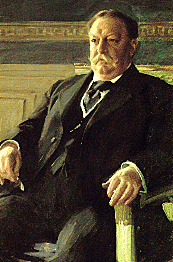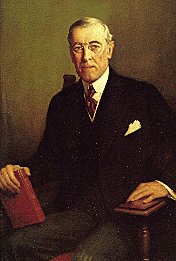Progressivism, 1909-1917,

William Howard Taft was elected in 1908 for the 1909-1913 term.
He was Theodore Roosevelt's hand picked successor, for TR believed that Taft would follow the policies
TR had established. He
had been an able and obedient aide during the Roosevelt presidency. Taft had lots of political experience, becoming a judge at age 34 and then serving
as civil administrator of the Philippines in 1900 and then as Secretary of War but not in electoral politics.
He was a lawyer and wanted to be Chief Justice of the United States Supreme Court, but TR and
Taft's wife, Helen Herron Taft, had pushed him into running for president.
This great man (he weighed over 300 pounds) was conservative by nature and did not believe in a dynamic presidency. He approached problems from
a legalistic standpoint. If it was against the law, he wanted it punished. In fact, because of these beliefs,
he was much more the "trust buster" than Teddy Roosevelt.
For the most part, he was committed to preserving the status quo but
willing to support moderate reform when he thought it necessary. The Dingley Tariff was sky high and the "reform" bill to lower it
was changed in the Senate into the Payne-Aldrich Tariff, which was a high tariff. Taft, like most Republicans,
believed that it was imperative to prevent foreign competition in manufactured goods and protect US industry, so he had no qualms signing the bill. He was
also willingly to use the power of the United States government to serve private business interests in Latin America.
Bankers and other financiers began playing a key role in the conduct of US policy in the Caribbean region. Part of
this "Dollar Diplomacy" was simply a matter of following through on the McKinley-Roosevelt decision to turn
the Caribbean into an American lake.
During Taft's presidency, Congress passed the 16th Amendment, creating an income tax, and the 17th amendment,
providing for the people of a state electing US Senators instead of the state legislature. the Mann-Elkins Act strengthened the Interstate Commerce
Commission. Postal Savings and Parcel Post accounts were created to aid small business and to provide a mechanism by which the average person could bank money. The federal Bureau of Mines
was created to give strong guidance to this very dangerous occupation. A Childrens Bureau was created,
reflecting the concern of Progressives that children needed special protection because too many mothers were
working outside the home. Although
Taft was pro-business and pro-industry, the Department of Labor was created.
Much of what Roosevelt had wanted in terms of reforming US society did not interest Taft, so the two men parted ways. Roosevelt tried to get the Republican
presidential nomination for 1912 but Taft, as president controlled the Republican Party machinery and got the nod. Roosevelt then broke with the party and ran on the Progressive or "Bull Moose" ticket, thus splitting the Republican vote.

Woodrow Wilson won the presidency against Roosevelt, Taft, and Eugene Debs, the Socialist Party candidate,
because of this split. Wilson was a Virginian raised in Georgia. That a Southerner would be nominated for
the presidency after the Civil War was a surprise associated him with New Jersey instead of the South. He graduated
the College of New Jersey, as Princeton University was then called, but returned to Virginia to earn his law
degree from the University of Virginia. He then earned the Ph.D. at Johns Hopkins University, a school that was then in the South.
He taught government at Princeton and then became its president in 1902. His brilliance and honesty prompted conservative Democrats to persuade him to run for
the New Jersey governorship in 1910. Thinking that he would go as long with the machine politics, which
were based in part on corruption, they were surprised when he turned out to be a reformer. He began cleaning up
New Jersey politics. In 1912, the Democratic Party nominated him for the presidency.
As president, Wilson thought that he should be a voice of the people. He wanted to restore free enterprise or competitive
capitalism so that people would have opportunity. His "New Freedom" platform
was thus more liberal than Roosevelt's "New Nationalism" platform because he believed that the government should break up monopolies in order to insure competition.
The Underwood Tariff (1913) was the first low tariff since before the Civil War, thus forcing US
industries to compete and lowering prices. His administration also had an income tax provision passed. The Federal Trade
Commission was created with the power to investigate business abuses and issue cease and
desist orders. The Clayton Anti-Trust Act forbade trusts, thus giving teeth to the Sherman Anti-Trust Act, which had been vitiated by conservatives. The Clayton Act
stipulated that labor was not a commodity, thus exempting labor unions from charges of monopoly. The Farm Loan Act provided longer term credits to farmers, making them a little less dependent upon urban bankers. The
Adamson Act required an 8-hour day on interstate railroads. Because railroads played such a central role
in the economy, this had the effect of decreasing work hours for many occupations. The Federal Reserve System was created as a compromise
between those who wanted a government central bank and those who feared the accumulation of power by
the national government. The System is owned by the members banks but with the president appointing the governors.
Wilson was a moralist and idealist who believed he was right. In his Latin American foreign policy,
he tried to impose his will on countries such as Mexico. Whereas the US had always recognized
governments regardless of who was in power (de facto recognition), Wilson would only recognize governments he considered legitimate. Thus, the US intervened
diplomatically and militarily in Mexico. When World War I broke out, he tried to keep the
US neutral even though he and other upper class Americans tended to favor the British. US entry into the war in q917 tipped the balance in favor of
the British-French-Italian-US coalition. Wilson went to Europe to negotiate the peace according
to his view of how the world should be run. The Europeans did not accept all of his Fourteen
Points. The Republican Party refused to ratify the Versailles Treaty without its own modifications; Wilson adopted an "all or none" policy and lost.
by Donald J. Mabry

